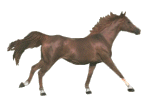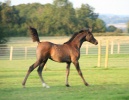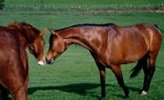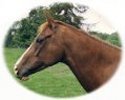| Author |
 Topic Topic  |
|
|
|
Vera
Membership Moderator
    
 United Kingdom United Kingdom
8652 Posts |
 Posted - 04 Jul 2006 : 09:44:01 AM Posted - 04 Jul 2006 : 09:44:01 AM




|
I know this has been discussed before and I looked for this article to post but couldn't find it. It has just appeared on another forum so thought I'd copy it here.
Because of this I don't feed garlic to any of mine. I fed it for years to my mare and in her later years she suffered from low blood counts. I only wish I'd had this information then.
Feeding Garlic - The Great Garlic Debate
Dr. Karen Hayes, DVM, MS, discusses whether or not to feed your horse garlic as a feed supplement or fly repellent.
By Karen Hayes, DVM, MS
It's heartening to see how passionate readers are about the care of their horses--and their garlic!
The toxic element in allium (a family of plants including both garlic and onions) is well known to be a chemical called N-propyl disulfide. By altering an enzyme present within the red blood cell, it depletes the cell of a chemical known as phosphate dehydrogenase (PD), whose job is to protect the cell from natural oxidative damage.
When the PD level gets low enough, the hemoglobin in the cell oxidizes and forms a "bubble" called a Heinz body on the outside of the cell--it's quite distinctive and readily seen under the microscope. The spleen--which acts as a red-cell "bouncer" of sorts--quickly removes the deformed cell from the bloodstream. As more and more red cells are prematurely damaged and removed, as will happen from consistent poisoning with N-propyl disulfide, your horse gradually becomes anemic. This is called Heinz-body anemia.
The "toxic dose" of N-propyl disulfide, which is not well worked out in any species, is the amount thought to cause obvious poisoning, a sort of "9-1-1" situation. Cows are thought to be more sensitive to the toxin than are horses, but in one study published in 1972 in the "Journal of the American Veterinary Medical Association," the toxic dose in horses turned out to be considerably less than the 5 grams per kilogram of body weight reported in cows.
Here's what happened. When horses in a pasture dotted with wild onions came down with anemia (low red-blood-cell count), jaundice (increased bile pigments in the blood, causing yellowish discoloration of the gums and whites of the eyes), and reddish-colored urine, investigators decided to find out for sure whether onions had caused these symptoms.
To do so, they fed 1 pound of the onion tops per day to a healthy horse for 3 days, along with his regular feed, then 4 pounds on Day 4. From Day 4 through Day 8, his packed cell volume (or PCV, meaning his red-blood-cell percentage) dropped about 23 percent, from 30 to 23.
The investigators continued to give the horse onion tops on Days 9 and 10; by Day 11, his PCV had dropped to a life-threatening 13--he'd lost almost 60 percent of his red blood cells in 11 days!
Most of us with a rudimentary interest in equine toxicology have no quarrel with this report, but what would've happened to pasture horses if they'd eaten smaller doses of the toxin? Good question--and here's where the controversy comes in.
Some vets say the toxic effects are more gradual and insidious--but still very real--when a lower dose is consumed on a regular basis, resulting in a mild anemia without obvious symptoms. This has been my experience in a practice. I see a handful of cases of Heinz-body anemia every year in horses that grazed on wild onions growing amidst the grass in their pastures, or helped themselves to discarded onions and leeks in the compost pile, or raided the garlic patch in the garden.
No well-designed, formal research has been conducted on the ill effects of lower doses of garlic on horses. But, to be fair, there also hasn't been any well-designed, formal research on the benefits of garlic in horses. For example, I've seen lots of horses reeking of garlic and crawling with flies, though garlic is reputed to be an effective fly repellent.
I've no doubt those of you who are feeding garlic to your horses are doing so because you want only the best for them--the best health and the highest degree of comfort. That's why I feel it's important for you to understand it isn't enough to say garlic is safe just because you haven't seen any ill effects in your garlic-supplemented horse. Depending on the dose, and the frequency and duration of dosing, there could be low-grade deleterious effects, due to red-blood-cell damage that's not enough to cause a 9-1-1 situation, but just enough to cause a mild anemia that might not be outwardly evident. It might affect your horse's stamina, energy level, or resistance to disease.
Until these suspicions are investigated and repudiated, how much risk are you willing to take? Until well-designed, formal research is done on garlic's risks and benefits, specifically in horses, it seems the only safe avenue is the avenue of caution. At the very least, I wanted each of you to make your decisions with benefit of all available information, including longstanding reports from researchers far greater than me, indicating that the popular garlic bulb has a dark side.
REFERENCES
Pierce, K.R., et al., Acute hemolytic anemia caused by wild onion poisoning in horses, "Journal of the American Veterinary Medical Association," 1972; pages 160/323 to 327.
Lewis L.D. "Equine Clinical Nutrition," Williams and Wilkins, 1995, page 480.
Kobluk, Ames, and George, "The Horse; Diseases and Clinical Management," Saunders, 1995, page 1,083.
Knight A.P. and Walter R.G. "A Guide To Plant Poisoning Of Animals In North America," Teton NewMedia, 2001, page 186.
Murphy M., "A Field Guide To Common Animal Poisons"; Iowa State University Press, 1996, page 160.
Dr.Hayes is an equine practitioner based in Idaho. She's a frequent contributor to Horse & Rider magazine and EquiSearch.
Vera and Dennis
|
    
Hampshire |
|
Report to moderator
|
|
|
LYNDILOU
Platinum Member
    

United Kingdom
13976 Posts |
 Posted - 04 Jul 2006 : 10:51:34 AM Posted - 04 Jul 2006 : 10:51:34 AM




|
well I for one am gobsmacked I have been feeding garlic for years and eat it myself regularly as I believed to to be good for the heart what are we to believe I have been feeding garlic for years and eat it myself regularly as I believed to to be good for the heart what are we to believe  |
   
www.dreamfield-arabians.com |
Report to Moderator  |
|
|
arabic
Platinum Member
    

England
4562 Posts |
 Posted - 04 Jul 2006 : 10:51:38 AM Posted - 04 Jul 2006 : 10:51:38 AM




|
OMG Vera!! Will have to stop feeding it then!! Dont want to risk anything thats going to do damage. Do you reckon that by stopping the garlic any harm it may have caused will right itself in time?? (sorry for being so thick!!)
Sandie |
Report to Moderator  |
|
|
Honeyb060674
Platinum Member
    

United Kingdom
4301 Posts |
 Posted - 04 Jul 2006 : 11:07:00 AM Posted - 04 Jul 2006 : 11:07:00 AM





|
| A friend of mine used to feed her gelding fresh garlic and he reeked of it, scary when you find these these things out. Its like the citronella. Luckily I stopped feeding Honey it as I wasn't sure it was having any success as a repellent) Would the anemia apply to humans too? |
      
Claire & Sunny x
http://sunnyandclaire.blogspot.com/ |
Report to Moderator  |
|
|
rhoni
Gold Member
   

United Kingdom
910 Posts |
 Posted - 04 Jul 2006 : 11:09:52 AM Posted - 04 Jul 2006 : 11:09:52 AM




|
| I stopped feeding garlic after reading this article some time ago and noticed that my in-foal mares started taking much more of their mineralised salt licks as soon as the garlic stopped. It was obviously supplying them with something. The sorts of doses of garlic/onion these researchers were using were very high, Sandie, so I doubt you've done any harm! As the article itself says, well-designed, formal research simply has not been carried out. Almost anything in a high enough dose is poisonous, including water. |
Report to Moderator  |
|
|
Deboniks
Platinum Member
    

England
3776 Posts |
 Posted - 04 Jul 2006 : 1:08:13 PM Posted - 04 Jul 2006 : 1:08:13 PM





|
| I posted this on here a few months back.Makes you really think about what you are actually feeding your horse! We all seem to feed by recomendation rather than looking into the pro's,cons and side affects. So many find out the benefits of herbs and feed then constantly without knowing the conciquences! Some herbs can only be fed for a matter of weeks until damage to vital organs can occur. It's the kill or cure! In the wild they would pick out what they need,when we add everything together it gets discuised and they just eat it.I like to offer diffent things if they need it they'll take it and if not they won't be interested at all. I think we all worry because most paddocks are full of just grass so horses lack the wild herbs and flowers. I used to swear by garlic and it IS very good if you know how to use it but over feeding it will cause annemia.Echinacea is another one to watch out for and must NEVER be used for more than six weeks as it causes damage to the liver.We know when our horses are off colour and like to help them we just don't have the knowledge and tend to over prescribe.I keep it natural as possible,I like to offer things but don't force them. |
        |
Report to Moderator  |
|
|
barbara.gregory
Platinum Member
    
United Kingdom
4531 Posts |
 Posted - 04 Jul 2006 : 1:53:51 PM Posted - 04 Jul 2006 : 1:53:51 PM




|
As Rhoni says, almost anything in excess is toxic. I have read this article before and I do feed mine a small amount of garlic in the summer in the hopes that it may keep some of the flies away (and eat it myself).
One of my comments on the article is "What health checks were carried out on the horse before the experiment was done"? The packed cell volume for a healthy horse is usually given as 32 - 52% so the horse had a low PCV (indicating a possible problem) BEFORE the trial. What happened to the PCV once the feeding of onion tops (not the same as garlic anyway) was stopped, did the horse normalise or was it not followed up? If the horse had a problem before the experiment then the effect of the onion tops may have been far greater or even different from what it would normally have been.
Please don't think that by feeding a small amount of garlic to your horses you are poisoning them. My old gelding would woof it down by the bucketful if given the chance whereas my stallion, who loves his food, won't even go near his feed bucket if he smells garlic. Consequently, he doesn't get it, he has told me quite clearly that he doesn't want it.
Barbara |
    |
Report to Moderator  |
|
|
arabic
Platinum Member
    

England
4562 Posts |
 Posted - 04 Jul 2006 : 1:58:09 PM Posted - 04 Jul 2006 : 1:58:09 PM




|
| Right then!!!! Garlic will no longer be served with the main meal! From now on I shall offer it as a side dish!!! and he can choose for himself. On second thoughts after he CHOSE to eat ragwort last week, probably not a good idea. |
Report to Moderator  |
|
|
Deboniks
Platinum Member
    

England
3776 Posts |
 Posted - 04 Jul 2006 : 2:40:54 PM Posted - 04 Jul 2006 : 2:40:54 PM





|
Hi Sandie,
You know your horse best and you have to look into the pros and cons etc of what you feed it.You have to ask your self why you feed it and does it work. Do some things need to be fed in the quantities we feed them? Last year I was feeding and applying a lot of garlic to reply the midges ect. This year I haven't, just to see for myself if there was a difference... and there hasn't been. I do think a little now and again must be good.
Horses do eat things that will make them ill. Why is this if they know what they're eating? I think it's because at one time they ate it through having not enough to eat and got a taste for it which made them seek it.Or maybe it has a trace eliment of something they lack? I know they like a variety of different grasses and herbs which most paddocks lack. I like to let horses eat out on a ride at times to so they can have something that doesn't grow in the paddock.
I'll offer a bottle of Aloe Vera juice if I think he needs it to. Every person on here has their own ways and reasonings so you'd be walking a mine feild to get the right answer. Like you I've learnt loads from this site and like my water bottle thread a lot of SH1TE to!  If you really think Freddie needs it....give it to him and see if it helps If you really think Freddie needs it....give it to him and see if it helps |
        |
Report to Moderator  |
|
|
arabic
Platinum Member
    

England
4562 Posts |
|
|
Zan
Platinum Member
    

Scotland
3213 Posts |
 Posted - 04 Jul 2006 : 7:05:32 PM Posted - 04 Jul 2006 : 7:05:32 PM





|
I fed my old mare garlic for decades---she was pts in her 40th year so I really don't think it did her any harm! She was a very wise horse---a real matriarch---and she always ate masses of wild garlic as well when the opportunity arose.
Onion tops ain't garlic and in that quantity and in that quantity there is no comparison to what the would normally eat. As Rhoni says, even water is poisonous in a big enough quantity. there is no comparison to what the would normally eat. As Rhoni says, even water is poisonous in a big enough quantity. |
    |
Report to Moderator  |
|
|
nicolanapper
Platinum Member
    
England
4247 Posts |
 Posted - 04 Jul 2006 : 7:21:20 PM Posted - 04 Jul 2006 : 7:21:20 PM




|
I am totallly amazed. Funny though my horses suddenly started to become very fussy this last winter (one in-foal arab mare, 2 arab geldings and one welsh cob Sec D) when we were putting garlic in their feeds, we stopped and almost instantly they started to eat their feeds again with gusto. Perhaps we were over doing it, as they have been having D & H pasture mix (which has added garlic) and Happy Hoof (again garlic added) plus garlic on top, poor little b.g..rs! 
Nicky |
Report to Moderator  |
|
|
arabic
Platinum Member
    

England
4562 Posts |
 Posted - 05 Jul 2006 : 11:49:03 AM Posted - 05 Jul 2006 : 11:49:03 AM




|
It certainly is a bit of a minefield. We have some on our yard who just wont touch their feed if it has any garlic in it and others who have it added purposely to disguise any nasty medications because they love it so much. Gave Freddie a little test this morning and offered him his clove whole, rather than chopping it in his breakfast. Woooooffff!!!! it was gone. I am going to give him a break from it for a while but at the moment the flies are horrendous and as he is not being half as bothered as the rest Im going to continue for a while.
Sandie |
Report to Moderator  |
|
| |
 Topic Topic  |
|
|
|

